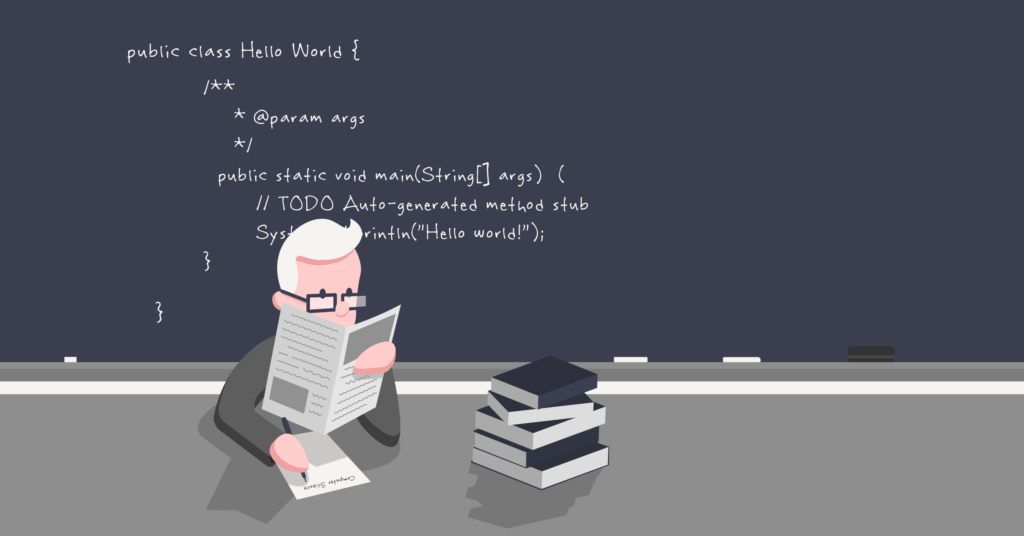Computer science is an amazing field of study, formalizing as a college discipline in the ’60s and evolving through the decades since to become part of daily life around the world. And, for some of us, it’s also turned into a passion.
Whether computer science is one of your college courses or just something of casual interest, this blog post is dedicated to you. Detailing 30 of the best computer science blogs, this list is a place to start; continue your own education and find enriching, intriguing topics related to this rapidly changing discipline, no matter your level of experience or your background.
For easy skimming and quick decision-making, I’ve rated each blog based on five different criteria:
- Writing quality: the overall quality and readability of the content the blog normally produces.
- Consistency: how often the blog produces new content.
- Longevity: the length of time the blog has been around, which often indicates the trustworthiness and authority of its content.
- Technical depth: the level of technical detail you can expect to find on the blog.
- Broad usefulness: how many different interests, disciplines, and skill levels the blog appeals to.
DigitalOcean
Currently the richest, most active place online, in my opinion, where you can read articles dedicated to computer science. A vast amount of contributors publish new content daily, from coding to data-structures, from networks to databases. A great place to start no matter what knowledge needs you may have in computer science.
- Writing quality: 5
- Consistency: 5
- Longevity: 4
- Technical depth: 5
- Broad usefulness: 5
- Overall score: 4.8
Stack Overflow Blog
Stack Overflow always keeps its promise to solve your technical problems. That’s true not only for their forum, but also for their blog, which publishes great, daily articles about computer science topics of all kinds, but with special regard for programming languages. Our founder Karl Hughes has also been a contributor.
- Writing quality: 5
- Consistency: 5
- Longevity: 3
- Technical depth: 5
- Broad usefulness: 5
- Overall score: 4.6
Freedom To Tinker

Hosted by Princeton University’s Center for Information Technology Policy, this is what happens when a research center explores the intersections of technology, engineering, public policy, and the social sciences. The UI is a bit hard to approach, but once you get past that, you’ll discover an amazing source for computer science articles. New content is posted weekly, from deeply technicals articles to discussions of the impact of technology on our daily lives.
- Writing quality: 5
- Consistency: 4
- Longevity: 4
- Technical depth: 4
- Broad usefulness: 4
- Overall score: 4.2
Coding Horror
The website name might make you think this site is all about coding, but creator Jeff Atwood has also dealt thoughtfully with growing a vast and rich library of content for computer science enthusiasts. New content isn’t published that frequently, but since the blog’s been around for more than 15 years, I’m sure you’ll find lots of little gems to build your knowledge.
- Writing quality: 5
- Consistency: 2
- Longevity: 5
- Technical depth: 5
- Broad usefulness: 4
- Overall score: 4.2
MIT Technology Review

You can probably guess what the main topic here is. The Massachusetts Institute of Technology has created a fantastic platform for self-education in computer science, with weekly articles that are especially great for students.
- Writing quality: 5
- Consistency: 5
- Longevity: 4
- Technical depth: 3
- Broad usefulness: 4
- Overall score: 4.2
Tutorialspoint
This website is the solution to whatever you may desire to learn in computer science. Find thousands of articles related to any tech field you can imagine, from databases to programming languages and computers’ hardware. Absolutely one of the best linear ways to study this discipline online.
- Writing quality: 3
- Consistency: 4
- Longevity: 5
- Technical depth: 4
- Broad usefulness: 5
- Overall score: 4.2
FreeCodeCamp
FreeCodeCamp is well-known to most developers out there. As years passed, the site established itself as one of the top places to go if you were interested in coding. But it doesn’t end there; hit up the blog with more than 6,000 articles covering not only programming languages but any computer science topic you may be curious about.
- Writing quality: 4
- Consistency: 4
- Longevity: 3
- Technical depth: 5
- Broad usefulness: 5
- Overall score: 4.2
GeekforGeeks
Like Tutorialspoint, GeeksforGeeks is a great resource for anything related to computer science, but with more regard toward code-centered topics, like data-structures and general programming languages. A great resource if you have an inclination for this side of tech, with articles published weekly.
- Writing quality: 4
- Consistency: 5
- Longevity: 4
- Technical depth: 4
- Broad usefulness: 3
- Overall score: 4
11011110
Irvine professor David Eppstein created this blog to publish weekly articles about nearly anything, but always through the eyes of a computer’s scientist. A great resource if you’re passionate about computer science and curious about approaching the world from a technical point of view.
- Writing quality: 4
- Consistency: 5
- Longevity: 4
- Technical depth: 4
- Broad usefulness: 3
- Overall score: 4
Khan Academy
The goal of the experts behind Khan Academy is truly moving: to provide the entire world with high-level—always free—online courses. Of course, the site includes a specialized computer science section, helping you take steps into this world with in-depth videos and text to make your lessons enriching.
- Writing quality: 5
- Consistency: 4
- Longevity: 4
- Technical depth: 4
- Broad usefulness: 3
- Overall score: 4
Treehouse Blog

Treehouse is a platform for teaching people how to code via online courses, and fortunately for all of us, they’ve decided to complement their resources with a fantastic technical blog. The blog’s articles run the gamut of computer science, from computer theory to programming languages and networks. They also offer great career advice, if you’re trying to enter the tech industry. Overall, I appreciate their clear interface and how well-edited their weekly articles are.
- Writing quality: 5
- Consistency: 4
- Longevity: 3
- Technical depth: 4
- Broad usefulness: 3
- Overall score: 3.8
Daniel Lemire
Daniel Lemire is a computer science professor at the University of Quebec (TELUQ) in Montreal. His research and, as a result, his blog are focused on software performance and data engineering. Find great weekly articles written by quite a talented and funny writer.
- Writing quality: 4
- Consistency: 5
- Longevity: 4
- Technical depth: 4
- Broad usefulness: 2
- Overall score: 3.8
Towards Data Science
One of the biggest Medium publications out there, Towards Data Science is focused, of course, on data science, but there’s a good amount of content related to programming languages as well. It’s the best fit if you’re interested in AI or machine learning, and bonus, new content is added daily.
- Writing quality: 5
- Consistency: 4
- Longevity: 3
- Technical depth: 5
- Broad usefulness: 2
- Overall score: 3.8
Google AI Blog
Artificial intelligence (AI) is a branch of computer science poised to take over our world in the next few decades, and Google is one of the companies leading that change. To share news of their forays into this world, they’ve created an intriguing, deeply technical blog. You’ll find hundreds of articles related to AI, so be prepared to learn something new every day.
- Writing quality: 5
- Consistency: 5
- Longevity: 3
- Technical depth: 4
- Broad usefulness: 1
- Overall score: 3.6
studytonight
With core principles similar to the Khan Academy, studytonight wants to share technical knowledge with students across the world for free. The site holds a vast library on all computer science topics, and is a great place to start with any question you may have about the nuances of the world of tech.
- Writing quality: 4
- Consistency: 4
- Longevity: 2
- Technical depth: 4
- Broad usefulness: 4
- Overall score: 3.6
Computational Complexity
Produced by computational theorists Lance Fortnow and Bill Gasarch, this blog provides weekly articles about computer science, mathematics, and the relationship between technology and people. Plan on going deep with articles that also analyze public figures and current events.
- Writing quality: 3
- Consistency: 5
- Longevity: 4
- Technical depth: 3
- Broad usefulness: 3
- Overall score: 3.6
Math ∩ Programming

Here, Google engineer Jeremy Kun talks about math and programming, with particular focus on the relationships between, well, math and programming and how they’re tightly tied together in the world of computer science. Not a very active blog anymore, but I found his content extremely interesting and the library of articles quite vast for a single author.
- Writing quality: 4
- Consistency: 2
- Longevity: 4
- Technical depth: 5
- Broad usefulness: 3
- Overall score: 3.6
John D. Cook
A former math professor and developer, John D. Cook is a consultant these days, with a weekly blog about solving daily problems with coding and math. You’ll also find cool articles about using coding skills in business.
- Writing quality: 3
- Consistency: 4
- Longevity: 3
- Technical depth: 4
- Broad usefulness: 3
- Overall score: 3.4
Cisco Blog
If you’re very inclined toward the networks side of computer science, be sure to check this one out. Cisco always makes a great impression with their professionalism, in their products and in their articles. You’ll find daily, professionally edited content related to networks and the future of connection.
- Writing quality: 4
- Consistency: 5
- Longevity: 3
- Technical depth: 4
- Broad usefulness: 1
- Overall score: 3.4
Lambda The Ultimate
Despite the old interface, this is still a great experience for all developers out there, with monthly pills of knowledge about programming languages from academic professors and computer scientists.
- Writing quality: 3
- Consistency: 4
- Longevity: 4
- Technical depth: 3
- Broad usefulness: 2
- Overall score: 3.2
Matt Might
One of the most pleasant experiences for readers interested in computer science, this blog contains thousands of articles from Matt Might, a professor in computer science. He doesn’t post very frequently, but thanks to the staggering quantity of content, this blog remains a valuable resource for all things tech-related, divided into subsections per topic of interest.
- Writing quality: 4
- Consistency: 2
- Longevity: 4
- Technical depth: 4
- Broad usefulness: 4
- Overall score: 3.2
Windows On Theory
Dedicated to discussing the theory of computation, this blog produces weekly academic-style articles.
- Writing quality: 4
- Consistency: 4
- Longevity: 4
- Technical depth: 2
- Broad usefulness: 2
- Overall score: 3.2
Gödel’s Lost Letter And P=NP
Another blog focused on the theory of computation, this site is maintained by academic professors Dick Lipton and Ken Reagan. They’ll delight you with their weekly articles introducing you to a variety of branches of computer science.
- Writing quality: 4
- Consistency: 4
- Longevity: 3
- Technical depth: 4
- Broad usefulness: 1
- Overall score: 3.2
Communications of the ACM
Dedicated to all aspects of computer science from AI to security to performance and even theory, new articles are published weekly for readers of all backgrounds and interests.
- Writing quality: 4
- Consistency: 4
- Longevity: 3
- Technical depth: 2
- Broad usefulness: 3
- Overall score: 3.2
Hackernoon

Producing new content daily regarding everything in tech, Hackernoon boasts a huge archive thanks to the contribution of their great community. Articles are constantly updated and well edited, discussing any computer science topic you can think of.
- Writing quality: 3
- Consistency: 4
- Longevity: 4
- Technical depth: 2
- Broad usefulness: 3
- Overall score: 3.2
Jason Ernst
Jason Ernst began his blog as a young computer science student in 2008, so you can expect his articles to be pretty technical. He hasn’t been posting a lot lately, but the archive is still a great pool of content, with a fun point of view from a young tech student.
- Writing quality: 3
- Consistency: 2
- Longevity: 5
- Technical depth: 3
- Broad usefulness: 2
- Overall score: 3
Computer Science Teacher
This is the personal blog of educator Alfred Thompson, and a great resource for other computer science teachers. Thompson’s weekly articles provide useful lessons on computer science, as well as cool programming challenges.
- Writing quality: 4
- Consistency: 4
- Longevity: 4
- Technical depth: 2
- Broad usefulness: 3
- Overall score: 3
Embedded In Academia
Created by John Regehr, professor of computer science at the University of Utah, this website publishes monthly articles on computer science. There are some rare deviations from the theme when the author discusses more personal topics, like trips or life experiences.
- Writing quality: 4
- Consistency: 2
- Longevity: 3
- Technical depth: 3
- Broad usefulness: 2
- Overall score: 2.8
Alan Winfield
Professor Alan Winfield has built a fun archive of content on the topic of robotics. Expect an intriguing article about once a month where he shares his creations and his thoughts about the world of robotics.
- Writing quality: 4
- Consistency: 2
- Longevity: 2
- Technical depth: 4
- Broad usefulness: 2
- Overall score: 2.8
Computing Education Research Blog
Created by Mark Guzdial, a professor at the University of Michigan in computer science and engineering, this blog encourages readers to understand computing. A great resource for people trying to better understand the field with weekly published articles.
- Writing quality: 2
- Consistency: 3
- Longevity: 3
- Technical depth: 2
- Broad usefulness: 3
- Overall score: 2.6
Conclusion
Finding places to renew and test your knowledge is vital to keep any passion alive, and hopefully, this list has helped you do just that.


